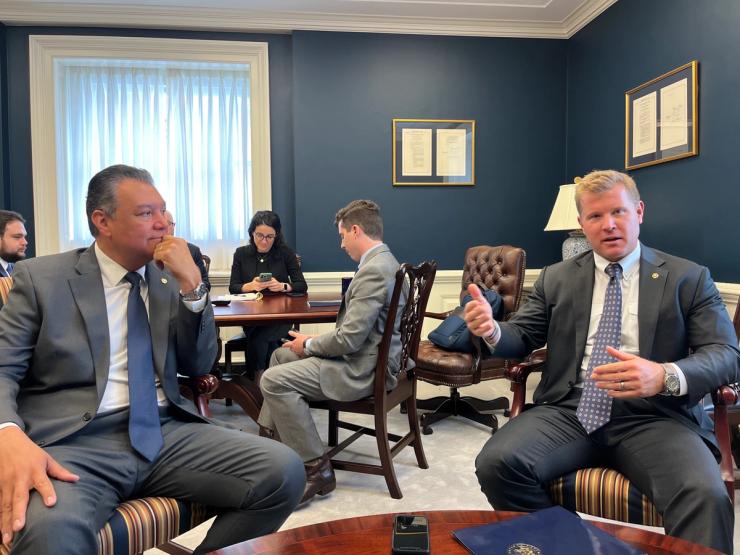The News
A few months ago, Alex Padilla was trying to keep Tim Sheehy out of the US Senate. Now the two senators are emerging as a forceful bipartisan duo.
The California Democrat and Montana Republican are collaborating on a series of bills intended to more aggressively fight the wildfire epidemic now gripping the country from coast to coast. They’ve bonded over raising kids as senators, shared drinks, and — yes — Padilla thinks Sheehy is an OK guy, despite defeating former Sen. Jon Tester, D-Mont., during Padilla’s stint as a deputy on Democrats’ campaign arm last year.
“Don’t get me wrong: I love Big Jon. I miss Big Jon,” Padilla said, sitting beside Sheehy in a rare joint interview with Semafor. “But the voters of Montana spoke. And I guess he’s not as bad of a guy as I heard.”
Fourteen new senators have been sworn in since the 2024 election, replacing departing bipartisan dealmakers. Senators are trying to rebuild cross-party relationships following that turnover, and Sheehy and Padilla show that it’s possible. Sheehy is a former Navy SEAL serving in his first elected office; Padilla was an engineer before grinding his way through California politics to the Senate.
The two met when Padilla spoke to new senators, just as wildfires were wreaking havoc on Los Angeles. Sheehy, who founded an aerial firefighting company in Montana, was an obvious partner for Padilla.
“If we can’t agree on literally making sure that cities don’t burn to the ground, then our republic is probably lost, you know?” Sheehy said.
Semafor spoke to both senators about their partnership and the half-dozen bills they are working on together, which address forest management, wildfire coordination and readiness. This conversation has been edited for clarity and brevity.
The View From sheehy and padilla
Burgess Everett: How do you all stay connected on these issues amid everything that’s happening in the Senate?
Tim Sheehy: We share margaritas. And some beer.
Alex Padilla: Modelo specifically.
TS: We make the point on the floor always to pop over: “Working on this, work on that.” We don’t have a set meeting. It’s not structured, but whenever we pass each other, make sure to give a quick update.
AP: I have him captive when I see him in the chair [presiding over the Senate]. He can’t run away from me.
How are you toggling Republicans’ request for executive action from President Trump with your legislative drive?
AP: I can’t wait for a joint letter to the White House once the bills get through both the Senate and the House. The Senate version of the Fix Our Forests Act is probably the prime example of what the collaboration can and should lead to.
TS: That bill is flying kind of under the radar so far. But the scope and the implications of that bill really will be vast. Fire is kind of the breaching tool to focus people’s attention on why it’s critical we get after it. But the impacts are far beyond just fire. It’s going to bring back a lot of common-sense management for our lands. … It’s going to help revive our struggling timber industry, where in certain areas it’s blossomed on private land, but on public land, in many cases, it’s been restricted. This legislation has been crafted in a bipartisan way. Fires burn blue states and red states equally, they don’t care.
One of the things you are trying to do is centralize the national fire response. Why?
TS: We have to. We keep referring to the West, which obviously is still the epicenter for it. But let’s not forget, just about a month and a half ago, that town that burned in New Jersey was in the 98th percentile of fire danger. It wasn’t a surprise. … Lahaina, the deadliest fire since Camp Fire — that was 99th percentile fire danger. That town had been modeled as a severe fire risk. Nothing had been done about it. So the disjointed, localized approach that’s being defended by a lot of folks? … The same people that walked us into this mess are not the same people that are gonna get us out of this mess.
Do you talk about climate change as you two work on this?
TS: For me, no. My background as a soldier is: I’m in the middle of a gunfight. While I’m in the middle of a gunfight, I’m not opining as to whether we should be where we’re at … my job is to fight the fight and win. If climate change is the cause of all these fires — guess what? Whatever dials we turn on the climate will be 20 or 30 or 40 or 50 years down the line. And in the meantime, we owe our communities better protection than we’re giving them now.
AP: We have to do both. So I agree that the here and now has created a crisis, has created a sense of urgency, which is why we’re doing this bill to be more strategic and effective in how we respond. But I do feel a responsibility to think: Why are there more frequent and larger wildfires? … California has been proudly a leader on things like the shift to renewable energy, electrification of the transportation system, just on and on and on to try to reduce emissions, because we also see how they’re connected. In 2020 wildfires alone in California offset emission reductions that we had made for 20 years.
TS: [In 2021] just two fires, the Dixie and the Caldor fires combined, emitted more carbon into the atmosphere than every single car in California.
How do you get to the finish line on these bills, like the Fix Our Forests Act?
AP: We’re committed to each other. If there are amendments that we agree and help strengthen the bill, then great. But no poison pills that unravel this agreement, because it was a tough negotiation. … When we first announced it publicly, I got a message from [Rep. Bruce] Westerman on the House side. First positive message. OK, that’s good. I can see the pathway to get out of the Senate, there’s more than just hope on the House side.


